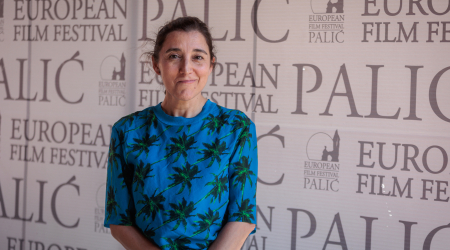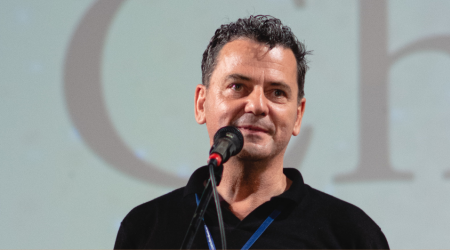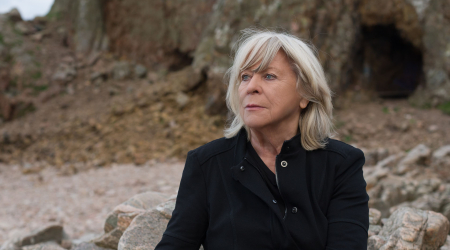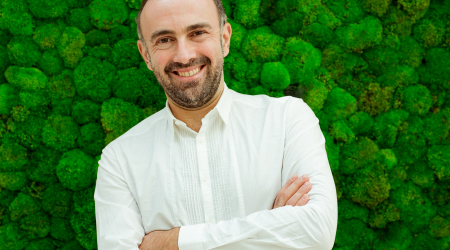Archived
Back to...Mirjana Karanović For me Aleksandar Lifka Award is a confirmation of my energy, strength, engagement in all the characters I played
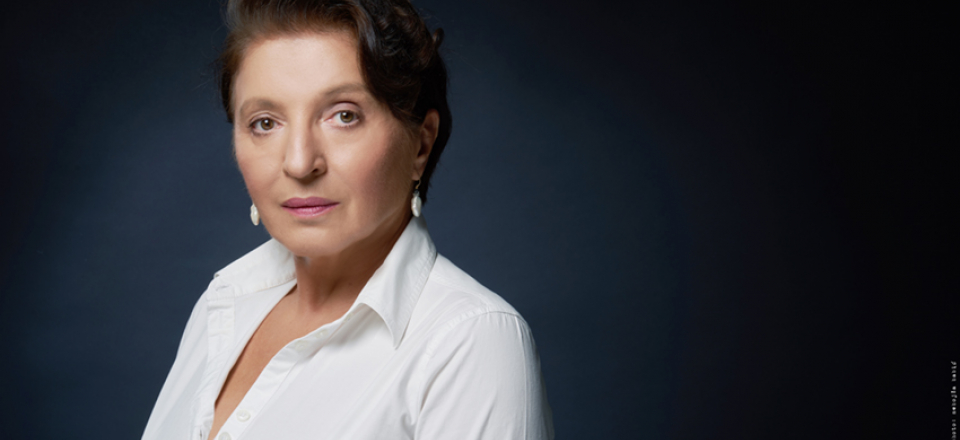
The legendary actress Mirjana Karanović is this year’s Serbian winner of the Aleksandar Lifka Award, which the Palić European Film Festival traditionally assigns for exceptional contribution to European cinema. She has been present on the stage for four decades, as if she was „subscribed“ to awards from the very beginning of her work on the film, starting with the Golden Arena in Pula for her debut role in the film PETRIA’S WREATH by Srđan Karanović. Few years later, she won the same recognition for her role in Kusturica’s WHEN FATHER WAS AWAY ON BUSINESS, which gained her world fame and recognition.
In 2006 she starred in film GRBAVICA by Bosnian-Herzegovinian director Jasmila Žbanić, which won the Golden Bear at the Berlin Film Festival. She is one of only five actresses who won the Golden Arena award in Pula twice. Last year she was the winner of the Dobrica Ring award for her life’s work, and during her long career she won dozens of other awards for her acting. He actively plays in theater, film and television. She made her directorial debut in 2016 with GOOD WIFE. In the festival’s explanation of the award, it is stated that „Mirjana Karanović is distinguished by her inexhaustible variety of acting, lavish and wealthy expression and courageous creative research. Mira’s roles are a huge line of opposites of different women, starting with illiterate peasant Petria in PETRIA’S WREATH to last year’s role of Mira Kušević in DIJANA BUDISAVLJEVIĆ’S DIARY. She stands freely in front of the film camera, and interprets the characters of women who have been severely damaged by human hatred and indifference in a convincing and emotional way, showing that in each of these roles and in herself as well, there is always enough strength for a new battle.“
As a very young actress, at the very beginning of career, you received several awards for the best actress, for roles in PETRIA’S WREATH and WHEN FATHER WAS AWAY ON BUSINESS. How did these significant awards shape you as an actress in your formative acting years, and how do you feel today, with 40 years of acting experience behind you, receiving Aleksandar Lifka Award for your contribution to European cinema?
I think whether you win awards at the beginning of your career or not, you never really know what will happen next. My views on that time now and then are completely different. All of these awards were some confirmation that I was good at what I had done. But that, as many have told me, was no guarantee that the rest of my career would be as successful. Many thought that success of Petria happened due to circumstances. That I, as such a young actress, was appropriate for that role, but the question was whether I will ever be able to play anything similar.
I wasn’t really shaken by such words, because all those people probably said that so that I wouldn’t be disappointed later. They told me about actresses who won Golden Arenas for their first roles, and after that didn’t go through anything special and had problems developing their careers. Since I never expected to be a film actress, and I was rejected twice at the Academy, I had no ilussions about myself that I was an actress for front pages. Petria was a big surprise for me and something unexpected. Not to mention the whole media pomp, front pages and interviews. It was all unexpected for me, which I quite enjoyed and had a lot of fun with. That’s how my life went. Nothing happened, I continued to live with my mom and dad.
At that time, I did not know that this was the beginning of a long and successful career that has lasted for 40 years and within which I received so many awards for my work in theater and film. For me Aleksandar Lifka Award is a confirmation of my energy, strength, engagement in all the characters I played. I did not allow myself or the people I worked with to make something that would be below the optimal standards I had for everything I did. I always wanted the maximum, but only mine engagement cannot be valid in a collective act, because neither the theater nor the film depends only on me, but also on other people. I always wanted the film I play in to be very good, for people to notice, both audiences and critics. Regarding that I have always been ambitious. I don’t think I thought about it in the past, and now I think I know that I invested in my heritage, in something that will stay behind me, something good that I will remembered for. I think I played in movies that you can watch today, and that I don’t have to be ashamed of. This has always been important to me.
Among the previous winners of Aleksandar Lifka Award are two directors who are very important for your film career – Srđan Karanović and Emir Kusturica. Do you remember working with them during the eighties of the last century, and what are the most important acting „lessons“ and suggestions you received from them?
From these two directors I gained my first serious experiences in film. They are two completely different energies and persons. It was very surprising for me, and for many people, that Srđan gave such a big and important role to a complete 20-year-old beginner. Back then I was literally like a blank piece of paper. Working on PETRIA’S WREATH was the first school of acting for me in front of the camera. Another big deal was with Kusturica, and things went further there, because Emir was then a young director of a lavish imagination he did not allow to be constrained by anything. No production, no money, no deadlines. He really worked and developed stories in which I played. We went trough very good process of preparation, and then came development of the story on the set.
As someone who writes screenplays today and is engaged in directing, I see that he really had the privilege and luck that, when the screenplay was written and as such was perfect, he could develop it on the set. Yes, in accordance with the actors who played certain roles, he got ideas on the spot. That’s what Chaplin did. I don’t know if there are other directors in the world who have done that, who let happenings in front of the camera to take them away in some direction, and let them imagine what else, what more can be done.
In my beginning those were the two most important directors. In these mature years, the first important director for me was Andrea Štaka, with whom I worked on MISS in Switzerland. For the first time, I worked on the character of a woman who is completely closed as person, does not show any emotions, and below that mask she is terribly turbulent, unhappy woman who actually hides what she feels. As I have always been extrovert in acting, for me the first big task was to put all knew aside, and work as an actress in some other way.
In fact, many things opened up to me, which I later developed with Jasmila Žbanić in GRBAVICA and later in my film, but also on other shootings. In a way, I transferred it a bit to the theater, because in fact I think that today both film and theater are moving towards the unification of visual identity – camera, as well as editing combined with good text and good acting, give the audience a complete experience. It is very interesting how content can be told and how emotions can be convincing, without exegerating, or palying directly. They can somehow hide and open up through some other things, and that’s very exciting. This approach has potential.
How do you choose roles, and how much has your criteria for accepting film roles changed over the past decades? What used to be most important to you, and what is most important to you today, when you read new script?
There are my criteria, but also criteria of directors who called me. I’ve never been an average-looking actress who could transform into a variety of characters. What I have and what I am has always required a stronger character. I was almost never even called for commercial roles. Neither the way of life, nor what I said for the newspapers, no matter how I behaved in general, was important to my popularity.
For me, the size of the role is not important, although it is nice to play a big role because you have space and you can develop it. But I played a lot of small roles, and it was always important to me to be able to make a masterpiece, a stunt. Some somersaults, because I can do triple somersaults in acting. I can do a lot of things, so it’s not interesting for me to just take a walk. Anyone can do that. I need something more challenging, at least one scene. For example, in the movie VIR, I played only one scene, the role of some inspector, and I made a masterpiece. Whatever you thought about that movie afterwards, I did that scene so I could be proud of myself. And that’s important to me.
It is important for me to talk to a director, to get to know the person I work with. Then my partners are important to me. Money comes in third place. It’s nice when everything coincides – when the director and the script and the colleagues and the contract are all good, then everything is great. It doesn’t match very often, but it does sometimes. It is important to me that there are at least two fulfilled criteria from the list.
What is important to you in relationship with colleagues and directors?
It is important to me to work with people who are ready to really live those characters in that moment, time and space for as long as a shot or a theater play lasts. That we live that moment together as one reality. Without any residue, calculation, without that „as much as I do for you – you must do for me“. I don’t like actors who keep something just for themselves. I think it’s pointless, and there are actors who are among those „not to spend“. As if acting is something that can be spent. I am not such a person. I like to give myself truely and have a partner who will accept that. Who will not take what I give, like emotion or impulse, as something of my own, because I am never private in acting, on stage or in the frame. If it was up to me personally, I would never do things my characters do privately. I would be ashamed. It’s very difficult when you come home and then think whether it’s you or your characters, although I’ve cleared it up.
However, there are movies that horrify me because I am so convincing in them. It is the case with the REQUIEM FOR MRS. J, about a depressed woman who is empty and so full of losses that she doesn’t even want to exist anymore. In a good part of the film, it doesn’t seem to exist, it’s like a shell. For me, watching that movie was so traumatic, because I didn’t see myself only as a character, but I saw myself and really thought that it could be me. That I could be that empty woman, who was completely drained. It took few days for my mind to explain my emotions how to stabilize, and to accept that. It’s always a problem with actors, especially when they play such difficult roles, or roles that are far from their personality. It’s hard to look at yourself, because if you do it well, then you’re horrified at the possibility that you actually have it in you.
Acting is a game. That’s why everything is so exciting and fun. Especially if you work with some people who are also looking forward to it, enjoying it … That is why I say it is important for me to talk to the director, to see if that person really fantasizes about it and if he has passion. I have a passion for acting. That’s what keeps me going. That’s why I need people who also have passion, a desire to play. For me, it’s similar to my childhood, when I went out on the street to see who I was going to play with. We all believe that we give our best, and that we enjoy it. It’s just that when you grow up, you approach it as a task, but I don’t allow it to be just a task that I need to do, I want it to be a game that I will enjoy. Otherwise, it’s very hard, your stomach hurts, you’re sick, you don’t want to be there, you want to leave. It’s awful when you do something and you do not feel like doing it.
Who are the colleagues you enjoy playing with, who share passion for acting with you?
That would be a really huge list, starting with my first partners such as Marko Nikolić, Dragan Maksimović, Pavle Vuisić, Miki Manojlović, Voja Brajović, Žarko Laušević, who are somewhere my generation, to these younger ones. It’s really hard for me to make that list. Ninety or more percent of the people I’ve worked with are like that. Maybe there are just a couple of actors who didn’t want to get into it, who didn’t want to look me in the eyes but looked next to me. And in the theater, I have only one such experience of an actor who, when I had a task to attack him, to knock him and squeeze him, was in the mood like „calm down a bit“. I couldn’t believe he thought I was doing it privately. I worked with actors who somehow gave up acting due to fatigue, age and to whom I gave everything, because I wanted to bring them back to that moment of common joy.
Do you have any roles that are especially memorable for you, and that you feel they may have passed „under the radar“ of the critics and the audience? What is your favorite „little“ movie in your career?
I really like the movie MALA. I love that character. Because of that woman and her destiny, and that time of the sixties. It was very interesting for me because I worked with Mira Joković. It was a pleasure to play with her. That film was not unnoticed, but it’s not one of those celebrated films.
On one occasion, you stated that you always wanted to improve yourself, and that acting helped you in that life goal. Which roles were particularly challenging for you, and which were the ones that helped you shaping yourself as a better person?
It’s not a matter of roles. It is, in fact, a matter of introspection. It is a mechanism that you naturally adopt when you are acting, because you are always working on something, you enter into communication either with your partner or the audience, and then it is valorized. Then you have to evaluate it in your head, say „yeah, let me see what this was“. Also, it is a constant matter of the process in which if something does not work, you have to see what it is. You have to deal with yourself, with your psychology. When you make a character, you try to shape a person from some words and sentences. You get a script, a text that you have to say, you talk about it with the director because you have to create a living being. Then you observe yourself, the people around you. Like it or not, you learn things about yourself and others.
Being a better actress for me has always meant looking at things, learning something. And I could always learn something from my characters. Not all of them. If you have a good script or a good book based on which you work, some things reveale to you. Something about life is revealed, starting with that Petria, by Dragoslav Mihajlović, it is literature that must influence you. You can actually feel what that woman thinks, it opens up some vistas for you, it opens up a perspective on a life you don’t have, or you didn’t pay attention to. If I play a person who has a completely different life view, then I have the opportunity to see the world from that position of power, defeat or some comic angle. I learn a lot about myself by working, but also by watching others work. There’s a lot of inspiration you can get from various movies and other actors that inspire you to try something new, different.
From idea in your head that looks phenomenal and perfect, to realization, there is one way. People look at us as spontaneous on stage or in the frame. For me, spontaneity is the result of a very serious analysis, preparation, many rehearsals. Than I feel safe . You can’t plan a shot in a movie. Very often things happen that are beyond my power, or something happens to the camera, or while you have the best emotional experience, you hear a plane passing by, and you have to repeat that. There are a lot of shots being made in the film that have to be repeated, especially if that segment of the scene is very emotional, it is a matter of serious concentration. You can put menthol in your eyes too, but I avoid it. For me, that’s not it. I need serious preparation, concentration and conditions to get that emotion and „produce“ tears, so that they are really mine.
How are you doing in theater?
It is a very similar situation, with the fact that in the theater you may have a little more time to prepare, but also it cannot come by itself. Tears or emotions are the result of something that already exists, some images, some previous assessments within us. Before the shot or the show, I have a whole stream that I have to follow so that what I do would be just a consequence. Emotions are a consequence of something. Some thoughts, some pictures … After that, the emotion comes quite naturally. I am not chasing emotion, but I am building a story from which emotion will emerge as a consequence quite logically and naturally.
The prestigious magazine „Variety“ also talks about your directorial career, which, after the premiere of your directorial debut GOOD WIFE at the Sundance Festival, placed you among 10 European authors to pay attention to. Why did you decide to become a director and what did this profession bring you that acting could not?
It is just a wider space in which I can express my creativity. It’s a matter of control. When I work with a director, I neither want to nor I have control over the entire content. I just deal with my role and the way the character I play contributes to the director’s idea. When I am a creator of a story, then it is logical for me to be a director as well. That actually happened – I wanted to tell a story and I wrote that story, some people helped me there, but I wasn’t ready to let anyone direct it, because for me it wasn’t a technical but an essential issue. All that together was my author’s act – the story, the character I play and the direction.
That is why I have never had the ambition to become a „director“ before. It is my own work in which I tell something that is perhaps much more personal, intimate and difficult than just playing a character. I rely on a director with a great pleasure, ask for support or ask for explanations, and when I am a director, then everyone relies on me and I have to know all the answers. That is why it is a much more complex and interesting thing. I gained some self-confidence, both personally and professionally, and I’m able to see myself in that role. I couldn’t imagine myself in that role before, until 2009. Than I actually wrote first „Treatment“. I didn’t even have a title for those ten pages of the story. That’s how it started.
Which Serbian and world directors do you especially appreciate and follow, and do you have any role models in directorial work, on whose film sensibility do you rely?
The director who had the greatest influence on me, purely in his directorial sense, is Andrea Štaka. I love the Darden brothers very much. That sensibility of theirs is something I enjoy the most. I love Krzysztof Kiszlowski, classics like Tarkovsky. I love directors who are a little different and who stab you with some emotions. But let me tell you – I love watching good Hollywood movies. Good blockbusters. I adore the whole X-Men series.
Back to...
